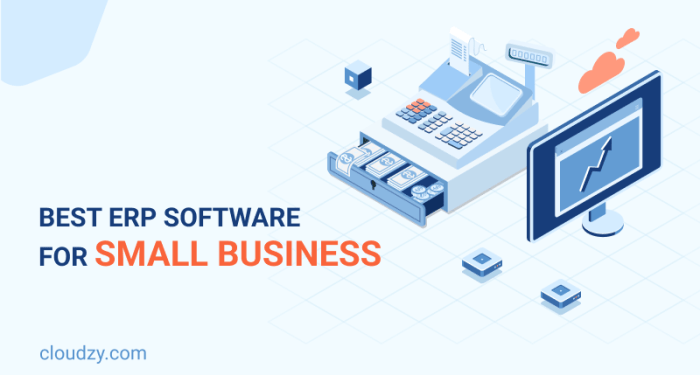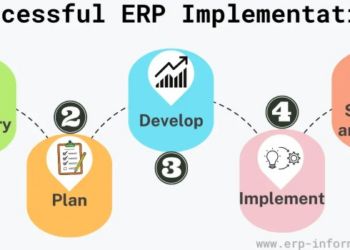Exploring the realm of ERP systems tailored for small businesses, this guide delves into the importance, factors to consider, top options, and implementation strategies. Let's uncover the transformative power of ERP solutions in optimizing small business operations.
Importance of ERP for small businesses
ERP systems play a crucial role in the success of small businesses by integrating various functions and processes into a single system, providing real-time data and insights for better decision-making.
Key Features of ERP for Small Businesses
- Centralized Data Management: ERP systems centralize all business data in one location, making it easier to access and analyze information across different departments.
- Streamlined Processes: By automating repetitive tasks and workflows, ERP systems help small businesses streamline their operations, reduce manual errors, and improve overall efficiency.
- Improved Collaboration: ERP systems facilitate better communication and collaboration among team members by providing a centralized platform for sharing information and updates.
- Cost Savings: With ERP systems, small businesses can eliminate the need for multiple software solutions and reduce operational costs by improving resource allocation and productivity.
Examples of ERP Streamlining Operations for Small Businesses
- Inventory Management: ERP systems can track inventory levels in real-time, optimize stock levels, and automate reordering processes, helping small businesses avoid stockouts and overstock situations.
- Financial Management: ERP systems can streamline financial processes such as invoicing, billing, and payroll, ensuring accurate and timely financial reporting for small businesses.
- Customer Relationship Management (CRM): ERP systems with CRM functionalities can help small businesses track customer interactions, manage sales pipelines, and improve customer satisfaction by providing personalized services.
Factors to consider when choosing the best ERP for small businesses
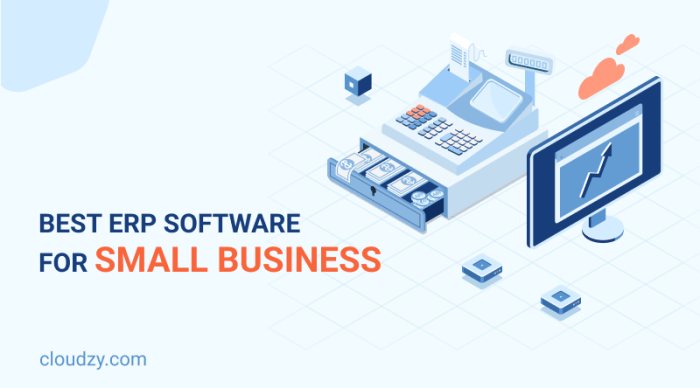
When selecting an ERP system for a small business, there are several crucial factors to consider to ensure that the chosen solution meets the specific needs and requirements of the organization. These factors include scalability and flexibility, cost-effectiveness, and the comparison between cloud-based and on-premise ERP solutions.
Scalability and Flexibility Requirements
Small businesses should prioritize scalability and flexibility when choosing an ERP system. The selected solution should be capable of growing and adapting alongside the business as it expands. It should allow for easy customization and integration with existing systems to accommodate changing business needs.
Cost-effectiveness and ROI Considerations
Cost-effectiveness is a critical factor for small businesses when investing in an ERP system. It is essential to consider not only the initial implementation costs but also ongoing maintenance and support expenses. Calculating the return on investment (ROI) of the ERP solution is crucial to ensure that it brings tangible benefits to the business.
Cloud-based vs. On-premise ERP Solutions
Small businesses must weigh the pros and cons of cloud-based and on-premise ERP solutions. Cloud-based ERP systems offer flexibility, scalability, and accessibility from anywhere with an internet connection. On the other hand, on-premise solutions provide greater control over data security and customization but may require higher initial investments and maintenance costs.
Top ERP options for small businesses
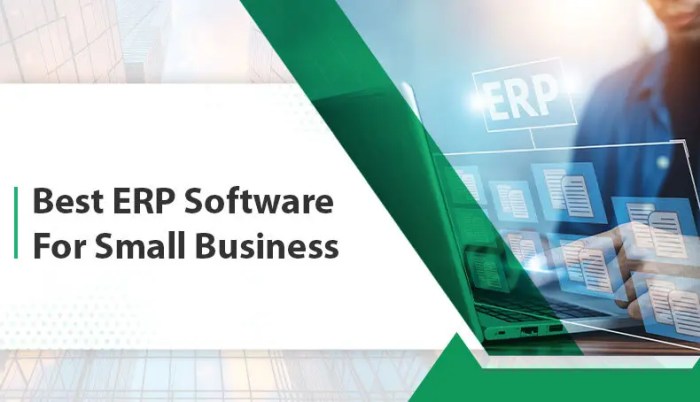
When it comes to choosing the best ERP system for your small business, it's important to consider the unique features and user reviews of each option. Here are some of the top ERP systems tailored for small businesses:
1. NetSuite ERP
NetSuite ERP is a cloud-based solution that offers a comprehensive suite of tools for managing financials, inventory, and customer relationships. It provides real-time insights and automation to help streamline business operations. Users praise its ease of use and scalability.
2. SAP Business One
SAP Business One is designed specifically for small and midsize businesses, offering features such as accounting, CRM, and supply chain management. It is known for its robust reporting capabilities and integration with other SAP products. Users appreciate its customization options and advanced analytics.
3. Microsoft Dynamics 365 Business Central
Microsoft Dynamics 365 Business Central is a cloud-based ERP solution that combines financials, sales, and operations management in one platform. It offers seamless integration with Microsoft Office tools and provides AI-driven insights for smarter decision-making. Users highlight its user-friendly interface and scalability.
4. QuickBooks Online
QuickBooks Online is a popular choice for small businesses looking for a user-friendly accounting solution. It offers features such as invoicing, expense tracking, and financial reporting. Users love its simplicity and affordability, making it ideal for startups and small businesses
5. Odoo
Odoo is an open-source ERP platform that offers a wide range of applications for sales, CRM, project management, and more. It is highly customizable and modular, allowing businesses to choose the features they need. Users praise its flexibility and community support.These ERP systems are among the top choices for small businesses, each offering unique features and benefits to help streamline operations and drive growth.
Implementation and integration strategies for ERP in small businesses
Implementing an ERP system in a small business can be a game-changer, but it requires careful planning and execution to ensure success. Integration with existing systems is crucial for a seamless transition and maximizing the benefits of ERP software.
Step-by-step guide for implementing an ERP system in a small business
- Assess current business processes: Identify areas that need improvement and align them with ERP functionalities.
- Set clear goals and objectives: Define what you want to achieve with the ERP system and communicate these goals to all stakeholders.
- Select the right ERP solution: Choose a system that fits your business size, industry, and specific needs.
- Allocate resources and budget: Ensure you have the necessary resources in terms of budget, IT support, and training for successful implementation.
- Customize and configure the ERP system: Tailor the software to meet your business requirements and train employees on how to use it effectively.
- Test the system: Conduct thorough testing to identify and address any issues before full deployment.
- Go live: Launch the ERP system in phases to minimize disruptions and monitor its performance closely.
- Evaluate and optimize: Continuously assess the system's performance, gather feedback, and make necessary adjustments for continuous improvement.
Best practices for integrating ERP with existing systems in small businesses
- Ensure data accuracy and consistency: Cleanse and consolidate data before integration to prevent errors and discrepancies.
- Establish clear communication channels: Keep all stakeholders informed and involved throughout the integration process to address any issues promptly.
- Train employees: Provide comprehensive training to ensure that employees are proficient in using the integrated ERP system.
- Monitor performance: Regularly monitor the system's performance post-integration to identify any issues and optimize processes.
- Collaborate with vendors: Work closely with ERP vendors and IT experts to resolve any integration challenges and leverage their expertise.
Checklist for successful ERP adoption in small businesses
- Define clear objectives and goals for implementing ERP.
- Involve key stakeholders in the decision-making process.
- Allocate sufficient resources and budget for implementation.
- Choose an ERP system that aligns with your business needs and goals.
- Customize and configure the software to meet specific requirements.
- Provide comprehensive training for employees to ensure smooth adoption.
- Conduct regular evaluations and optimizations to maximize ROI.
Final Summary
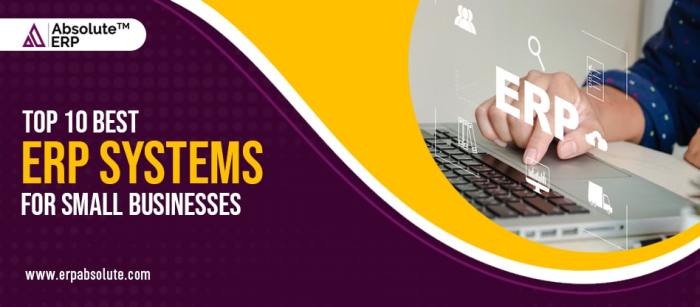
In conclusion, the world of ERP for small businesses is vast and full of opportunities. By choosing the right system and implementing it effectively, small businesses can enhance efficiency and unlock growth potential. Dive into the realm of ERP and watch your business thrive.
Top FAQs
What are some key features that make ERP beneficial for small businesses?
Some key features include integrated applications, real-time data access, automation of repetitive tasks, and scalability to grow with the business.
How do cloud-based ERP solutions differ from on-premise ERP solutions for small businesses?
Cloud-based ERP solutions offer flexibility, accessibility from anywhere, and lower initial costs, while on-premise solutions provide more control over data and customization options.
What are some best practices for integrating ERP with existing systems in small businesses?
Some best practices include conducting a thorough analysis of current systems, ensuring compatibility between ERP and existing software, and providing adequate training for employees.

